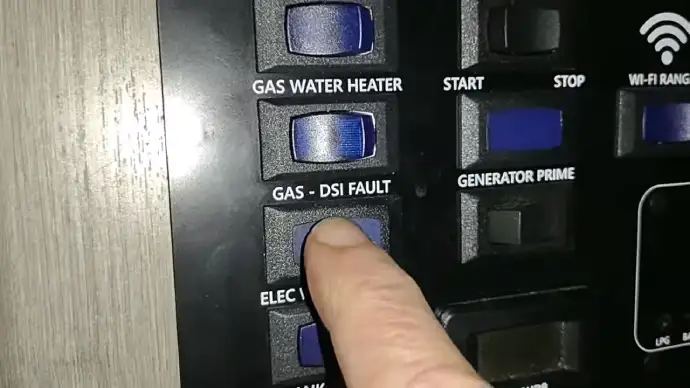Last Updated on December 24, 2023
RV water heaters provide hot water for sinks and showers. One of the most important parts of an RV water heater is the Direct Spark Ignition (DSI) system.
This system is responsible for igniting the gas burner to heat the water. However, when a DSI fault occurs, it means that there is a problem with the system.
There are many reasons why a DSI fault can occur, including issues with gas or propane flow, an empty water tank, a clogged burn chamber, or a lack of airflow. Unfortunately, DSI faults are fairly common and can cause the water heater to malfunction.
Accordingly, it is of utmost importance to grasp the occurrence of DSI faults and how to address them effectively. This piece explores DSI fault RV water heaters and thoroughly explains troubleshooting the issue.
What Does the Term DSI Mean in RV?
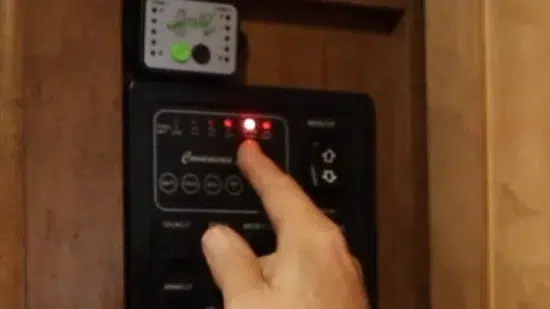
DSI stands for direct spark ignition and is a mechanism used in RV water heaters to allow for easy and safe lighting without the use of a pilot flame. Instead, the burner in the water heater heats the water in the storage tank until it reaches the desired temperature and then automatically turns off when not in use.
Users simply need to switch on the gas mode control inside their RV to activate the DSI spark igniter. This method is safer than using a pilot flame as it ensures that the water heater is always properly lit. As a result, manual lighting methods are less likely to result in accidents.
Moreover, DSI water heaters offer greater convenience and ease of use for RV owners who don’t have to constantly monitor the water heater’s pilot flame. They typically come with a six or ten-gallon water storage tank capacity, making them a reliable choice for RV owners.
It’s crucial to check the bypass valve and water pump to ensure that there is water in the heating tank before using a DSI water heater. To ensure complete combustion, adjust the flame height and color so the propane flame is electric blue with a hint of yellow or orange at the tip.
What Causes a DSI Fault in an RV Water Heater?
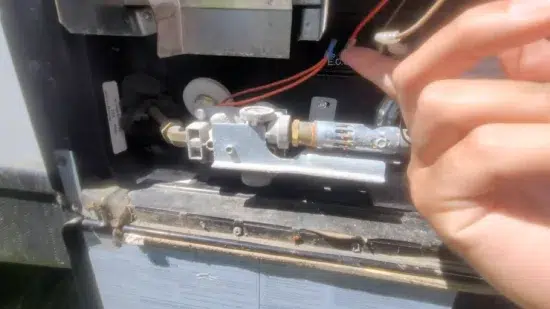
Numerous factors may contribute to a DSI fault within an RV water heater. Below highlights some of the prevailing causes:
## Lack of Gas or Propane Flow
The DSI system in an RV water heater requires a steady flow of gas or propane to function properly. If the propane tank is empty or there is a problem with the gas supply, the DSI system will fail to ignite. It is important to regularly check and refill the propane tank as needed to ensure a consistent gas supply.
It is crucial to fix any problems with the gas line or gas valve as soon as possible to prevent a DSI fault.
## Empty Water Tank
If the water tank in your RV is empty, it can prevent the heating system from igniting. This is particularly true for the Direct Spark Ignition (DSI) system, which requires water as a safety measure. The DSI system checks for water in the tank before igniting the propane gas used to heat it.
However, if the water tank is empty, the DSI system will not detect water and will not ignite the propane gas necessary for the water heater to function. This can result in a DSI fault, which could affect the water heater’s performance or cause it to stop working entirely.
## Clogged Burn Chamber
If debris or residue accumulates in an RV’s heating system burn chamber, it can prevent ignition and cause inefficient and unsafe operation. With Direct Spark Ignition (DSI), the burn chamber is critical in igniting the gas that heats the water tank.
Fuel consumption may increase as the heating system requires more energy to compensate for the obstruction. Meanwhile, gas leaks or explosions can damage the RV severely and endanger its occupants.
## Defective Control Board
Another common cause of DSI faults is a defective control board. The control board is the brain of the DSI system and is responsible for regulating the flow of gas and electricity to the water heater.
When the control board is faulty or malfunctioning, it can send false signals to the ignition system, causing it to fail. A qualified technician can diagnose a defective control board using specialized equipment. If the control board is found to be faulty, a replacement is necessary.
## No Airflow
A lack of airflow or a possible leak can cause DSI faults in RV water heaters. Airflow ensures that the propane or gas ignites properly in the burn chamber. Any leaks in the system can also inhibit proper airflow, leading to a DSI fault.
Regular ventilation systems and gas line inspections can help prevent this issue. Also, any leaks or damage should be repaired promptly to prevent further problems, including DSI faults.
How Can Future Dsi Fault Lights Be Prevented?
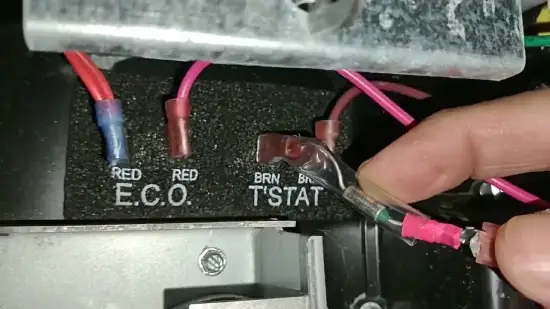
Conducting routine maintenance for your water heater is essential to prevent the recurrence of DSI faults. Consider the following suggestions:
1. Perform Regular Maintenance
Regular maintenance of the RV water heater is essential to prevent potential issues such as a DSI fault. It is advisable to consult the owner’s manual or contact the manufacturer for specific instructions on performing regular maintenance.
Generally, regular maintenance includes:
- Inspecting the anode rod, which prevents corrosion of the tank
- Cleaning the burner assembly to ensure it is free of debris, which can cause improper combustion and lead to a DSI fault
- Checking the pressure relief valve to ensure that the water pressure inside the tank does not exceed a safe limit
- Flushing the tank removes sediment buildup, which can cause the water heater to overheat and lead to a DSI fault.
2. Keep the Water Heater Rust-Free
To ensure your water heater works optimally and lasts for years, keeping it rust and debris-free is crucial. Over time, sediment and rust can accumulate in the tank, reducing efficiency, shorter lifespan, and causing expensive repairs. This buildup can also create unpleasant noises.
Fortunately, regular maintenance can prevent this. It involves draining and flushing the tank, inspecting the anode rod, and checking for leaks, as mentioned above. Also, checking for leaks identifies potential issues before they become costly problems.
3. Check Water and Gas Supply Before Traveling
Before departing on a trip, checking the water and gas supply to avoid any inconvenience during the journey is essential. The water supply is vital in providing hot water for everyday use, such as bathing and cooking. Hence, it’s advisable to check the water tank’s level and ensure enough water lasts.
Similarly, it’s equally crucial to double-check the gas supply that powers the RV water heater. A lack of gas supply might lead to a DSI fault, which hampers the heating process as a Direct Spark Ignition system fails to ignite the gas burner.
How to prevent the Initial RV water heater DSI fault?
Following a few straightforward steps is essential to avoid any potential DSI issues with your RV water heater. Begin by confirming that your propane tank is full and providing a sufficient fuel supply, as it is essential to the operation of the water heater.
Next, regularly check the water heater for potential issues, such as leaks or corrosion. It’s crucial to catch these problems early on to prevent any damage to the water heater. Additionally, always follow the manufacturer’s instructions regarding the maintenance and cleaning of the water heater.
If you do experience an initial DSI fault, don’t panic. Simply locate the reset button on the water heater, which may be positioned differently depending on the RV model. Follow the instructions in your owner’s manual to perform a reset, and your water heater should be back up and running in no time.
How long does it take for the water heater to heat up after resetting?
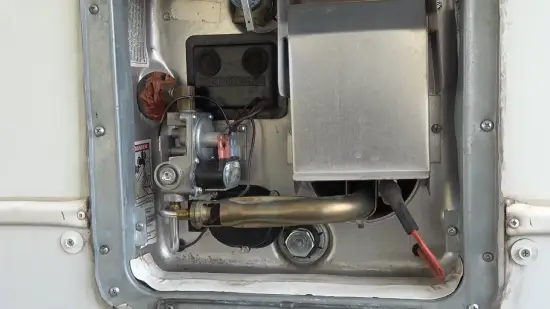
If you have just reset your water heater, don’t be surprised if it takes a little while for the water to heat up to your desired temperature. Gas water heaters usually take 30-40 minutes to fully heat up, while electric water heaters can take 1-1.5 hours.
During the waiting period, it’s a good idea not to use hot water so that all the heat can go towards heating up the tank. Once you’ve given your water heater a little time to heat up, you should be able to enjoy hot water in your home just like before.
Note: Be patient when working with water heaters, as they can take some time to heat up and stabilize fully.
When should you contact a professional for assistance with a DSI fault?
If the provided solutions and reset do not fix a DSI fault issue in an RV water heater, seeking professional assistance is recommended. Damage can worsen if a repairman is not contacted immediately. It is possible to detect a DSI fault by cold or lukewarm water coming out of the heater, constant shutoffs, and no lights on it.
A repairman can identify the cause of the problem and provide a solution that works best, whether replacing a faulty igniter or fixing a malfunctioning gas valve. It is essential to seek the help of an experienced technician to avoid causing more damage to the heater.
Note: A DSI fault issue can be frustrating, and professional help can help alleviate the issues.
Understanding DSI and Its Causes Is Crucial for Prevention
DSI faults in RV water heaters are a common issue that can result from several factors. Understanding what DSI means and the key causes of DSI faults is crucial in preventing future occurrences. Consistent upkeep and inspections can greatly reduce the chances of DSI faults in RV water heaters.
It’s vital to abide by the manufacturer’s safety guidelines and instructions when operating RV water heaters. Seek professional help if DSI faults persist despite your best efforts. Tampering with the water heater without the right knowledge and expertise can be dangerous and cause serious problems.
Overall, comprehending DSI faults and acting proactively to prevent them can ensure that your RV water heater runs efficiently for a long time.

